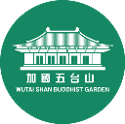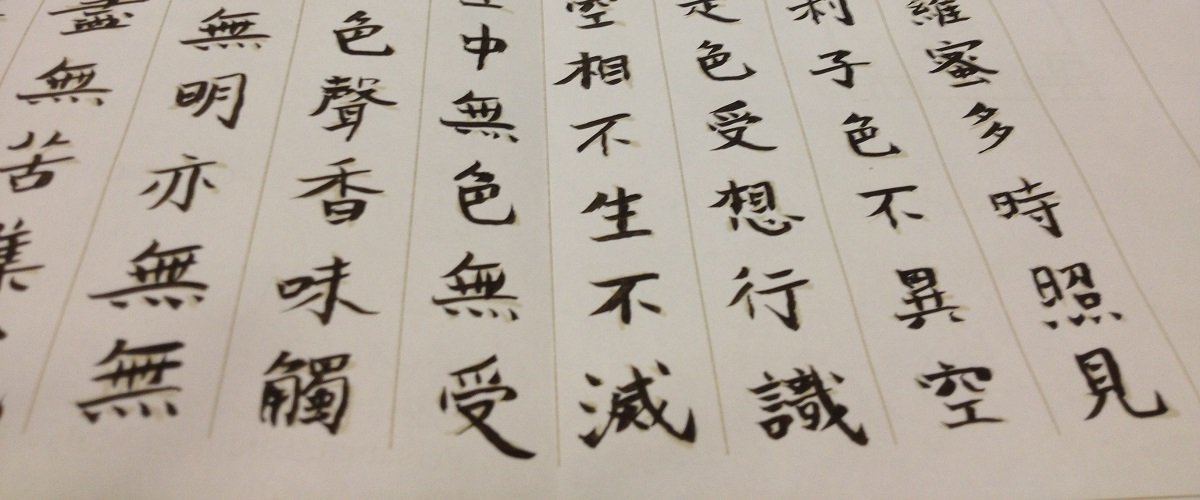bō rě bō luó mì duō xīn jīng。
般 若 波 羅 蜜 多 心 經。
The Heart Of Prajna Paramita Sutra。
guān zì zài pú sà , xíng shēn bō rě bō luó mì duō shí,
觀 自 在 菩 薩,行 深 般 若 波 羅 蜜 多 時,
When Bodhisattva Avalokiteshvara was practicing the profound Prajna Paramita,
zhào jiàn wǔ yùn jiēkōng, dù yī qiē kǔ è。
照 見 五 蘊 皆 空,度 一 切 苦 厄。
he illuminated the Five Skandhas and saw that they are all empty, and he crossed beyond all suffering and difficulty。
shè lì zǐ, sè bù yì kōng, kōng bù yì sè ,
舍 利 子,色 不 異 空, 空 不 異 色,
Shariputra, form does not differ from emptiness; emptiness does not differ from form.
sè jí shì kōng , kōng jí shì sè。
色 即 是 空, 空 即 是 色。
Form itself is emptiness; emptiness itself is form。
shòu xiǎng xíng shí,yì fù rú shì。
受 想 行 識,亦 復 如 是。
So too are feeling, cognition, formation, and consciousness.
shè lì zǐ, shì zhū fǎ kōng xiāng,
舍 利 子,是 諸 法 空 相,
Shariputra, all Dharmas are empty of characteristics.
bù shēng bù miè, bù gòu bù jìng, bù zēng bù jiǎn ,
不 生 不 滅,不 垢 不 凈,不 增 不 減,
They are not produced, not destroyed, not defiled, not pure; and they neither increase nor diminish.
shì gù kōng zhōng wú sè, wú shòu xiǎng xíng shí,
是 故 空 中 無 色,無 受 想 行 識,
Therefore, in emptiness there is no form, feeling, cognition, formation, or consciousness;
wú yǎn ěr bí shé shēn yì,
無 眼 耳 鼻 舌 身 意,
no eyes, ears, nose, tongue, body, or mind;
wú sè shēng xiāng wèi chù fǎ,
無 色 聲 香 味 觸 法,
no sights, sounds, smells, tastes, objects of touch, or Dharmas;
wú yǎn jiè, nǎi zhì wú yì shí jiè,
無 眼 界,乃 至 無 意 識 界,
no field of the eyes up to and including no field of mind consciousness;
wú wú míng , yì wú wú míng jìn,
無 無 明,亦 無 無 明 盡,
and no ignorance or ending of ignorance,
nǎi zhì wú lǎo sǐ, yì wú lǎo sǐ jìn。
乃 至 無 老 死,亦 無 老 死 盡。
up to and including no old age and death or ending of old age and death.
wú kǔ jí miè dào, wú zhì yì wú dé, yǐ wú suǒ dé gù。
無 苦 集 滅 道,無 智 亦 無 得,以 無 所 得 故。
There is no suffering, no accumulating, no extinction, and no way, and no understanding and no attaining.
pú tí sà duǒ,
菩 提 薩 埵,
yī bō rě bō luó mì duō gù,
依 般 若 波 羅 蜜 多 故,
xīn wú guà ài。
心 無 掛 礙。
Because nothing is attained, the Bodhisattva through reliance on Prajna Paramita is unimpeded in his mind.
wú guà ài gù,
無 掛 礙 故,
Because there is no impediment,
wú yǒu kǒng bù,
無 有 恐 怖,
he is not afraid,
yuǎn lí diān dǎo mèng xiǎng,
遠 離 顛 倒 夢 想,
and he leaves distorted dream-thinking far behind.
jiū jìng niè pán。
究 竟 涅 槃。
Ultimately Nirvana!
sān shì zhū fó,
三 世 諸 佛,
yī bō rě bō luó mì duō gù,
依 般若 波 羅 蜜 多 故,
dé ā nuò duō luó sān miǎo sān pú tí。
得 阿 耨 多 羅 三 藐 三 菩 提。
All Buddhas of the three periods of time attain Anuttara-samyak-sambodhi through reliance on Prajna Paramita.
gù zhī bō rě bō luó mì duō,
故 知 般 若 波 羅 蜜 多,
shì dà shén zhòu,
是 大 神 咒,
Therefore know that Prajna Paramita is a Great Spiritual Mantra,
shì dà míng zhòu,
是 大 明 咒,
a Great Bright Mantra,
shì wú shàng zhòu,
是 無 上 咒,
a Supreme Mantra,
shì wú děng děng zhòu。
是 無 等 等 咒。
an Unequalled Mantra。
néng chú yī qiē kǔ,
能 除 一 切 苦,
It can remove all suffering;
zhēn shí bù xū。
真 實 不 虛。
it is genuine and not false.
gù shuō bō rě bō luó mì duō zhòu。
故 說 般 若 波 羅 蜜 多 咒。
That is why the Mantra of Prajna Paramita was spoken.
jí shuō zhòu yuē:
即 說 咒 曰:
Recite it like this:
jiē dì jiē dì,
揭 諦 揭 諦,
Gaté Gaté
bō luó jiē dì,
波 羅 揭 諦,
Paragaté
bō luó sēng jiē dì,
波 羅 僧 揭 諦,
Parasamgaté
pú tí sà pó hē。
菩 提 薩 婆 訶。
Bodhi Svaha!


